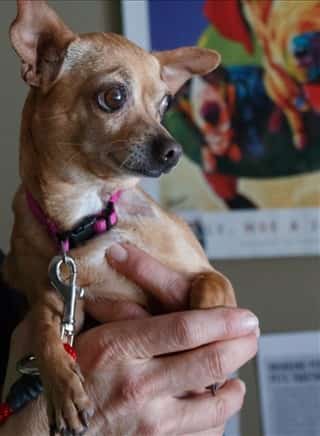Rescues
Chihuahua Rescues – Care and Information
Overview
The Chihuahua is one of the most common breeds found at shelters and rescues. Fortunately, they are also one of the most adopted breeds. Whether you’ve already adopted a Chihuahua or are thinking about doing so, this article will cover everything you need to know.
Meet 5-year-old Pepe.
He was adopted at 2-years-old and the main challenges were a bad flea infection, parasites, not being house broken, and he was underweight for his height at just 4 and 1/2 pounds.
Jump ahead 3 years and this handsome little guy is house trained (there is just occasional marking),
the fleas and parasites are long gone,
and he's described as playful, submissive, and devoted.
Photo courtesy of Joanne Entrekin
Rescue Chihuahua Statistics
At least 23% of households with Chihuahuas obtained their puppy or dog from a shelter or rescue.
In a very comprehensive survey that PetChiDog sent out in 2018 (the full survey results can be found in PetChiDog’s GIANT Book of Chihuahua Care) involving 3272 Chihuahua owners, one of the questions we asked was ‘How did you obtain your Chihuahua?’ and 23% of respondents chose ‘a shelter or a rescue’ as their answer.
However, another 12% of owners obtained their Chihuahua puppy or dog in an unusual way, with many simply finding their Chihuahua before a shelter or rescue was even involved. Comments left in the survey included:
- She was thrown out of truck in front of my house
- A friend had a coworker who couldn’t keep their Chihuahua because he didn’t get along with her other pets
- Flea market
- Found running with no collar on a cold night
- Found on a street
- Found him while walking on my block
- Note posted in my vet's office
- From someone who couldn't look after him any longer
- A yard sale
- Rescued by my neighbor
Chihuahuas are found in shelters more often than many other popular small dogs.
When compared with similar surveys conducted by other toy or small breed informational resources, the number of rescued Chihuahuas (23%) is a higher ratio than Pomeranians (12%), Yorkshire Terriers (8%), and Pugs (9%).
As of July 2019, the Chihuahua is the 3rd most common breed found at shelters across the United States. Per self-reported data in PetFinder, an online directory of almost 11,000 animal shelters and adoption organizations across the US, Mexico and Canada, shows there were 10,983 Chihuahuas or Chihuahua mixes up for adoption as of July 2019. The only two breeds that topped this were German Shepherds (12,399) and Labrador Retrievers (22,092).
But the distribution of Chihuahuas is uneven.
Some state’s shelters are overflowing with Chihuahuas and some states have nearly none. For example, just in 2013 alone, Phoenix Arizona’s two largest shelters, the Maricopa County Animal Care & Control and the Arizona Humane Society, received a huge number of Chihuahuas: 10,535. Of those, 2,100 were not adopted fast enough and were, sadly, euthanized.
At that same time, the Paws to Heart Rescue in Pennsylvania, frequently received requests for Chihuahuas but almost never had any available.
In an effort to save the most at-risk Chihuahuas in Arizona (set to be euthanized), the Paws to Heart Rescue sent volunteers across the country to pick up and drive home 26 Chihuahuas. They received a lot of applications and all but 1 Chi was adopted out within the first 2 months.
Overall, the Chihuahua is the #1 breed that is adopted out.
Though the Chihuahua came in 3rd for overall availability, more people choose to adopt a Chihuahua than any other breeds commonly found at shelters and rescue leagues. According to the ASPCA’s most recent compilation of shelter statistics, there were more Chihuahuas adopted out than American Stafford Terriers (AKA pitbulls, 2nd place), Labrador Retrievers (3rd place), German Shepherds (4th place), and Terriers (all terrier types, 5th place).
Meet Yogi.
This awesome little guy is 7 years old.
His human, Chris, found him through a non-breed specific dog fostering group. He'd been there
about a year along with other dogs.
Chris and Yogi met in a park and hit it off right away.
It's now been a year and a half and things are going well; Yogi is very content with his new life.
Photo courtesy of Chris Lawrence
Why are there so many Chihuahuas in shelters?
One reason that cannot be overlooked is that there are a lot of Chihuahuas to begin with.
The American Kennel Club keeps records of how many purebred dogs are registered in any given year. This is how they come out with their lists of most popular breeds. Out of the 193 purebreds recognized by the AKC (at the time of this writing), the Chihuahua has been in the top 40 for years. The Chihuahua was #30 in 2016, #32 in 2017 and #33 in 2018.
This said, statistically speaking, a higher ratio of Chihuahuas end up at shelters than other prevalent breeds.
For example, the French Bulldog is very popular. They came in at #11 on the AKC’s list in 2013, have risen each year since then, and as of 2018 were the 4th most registered breed in the US. But, a quick look at PetFinder’s database of adoptable dogs shows just a mere 116 available throughout the entire country as of July 2019.
Or look at the Poodle (all sizes) which has been in 7th or 8th place on the AKC’s most popular list for years. As of July 2019, there were only 1545 up for adoption, compared to the 10,983 Chihuahuas waiting for new homes.
Just how many Chihuahuas from the overall US population are surrendered to or otherwise find their way to shelters can only be estimated.
Looking at canines in general, the Veterinary Medical Association estimates there are 77 million dogs in the United States. And the ASPCA estimates that 3.3 million dogs enter into shelters each year. So, for canines as a whole, this is a rate of .043 (less than half of 1%) that are rescued, surrendered, or otherwise.
Since we know that Chihuahuas are becoming rescues at a faster rate than other breeds, the percentage that end up as shelter dogs may be in the 1 to 2% range.
So, back to why this is happening…
Part of the reason for high Chihuahua shelter intake ratio is linked to this breed’s size.
Puppy mills often find larger profit when their breeding dogs are smaller. Sadly, the more they can cram into cages, the more dogs there will be to produce litters.
And despite a huge increase in public awareness, puppy mills are rampant.
There is an estimated 10,000 in the US as of 2019. Though some are raided which inevitably leads to the pups being brought to shelters, many go on unchecked. There are 15 US states with little to no regulations that would otherwise be grounds for shutting down the facilities. In those states, as long as the pups are sold online and not to pet stores, they do not need to be federally licensed or inspected.
But more often than not, it is unprepared owners that, based solely the breed’s expected size, assume that a Chihuahua will be super-easy to take care of.
And, in some respects, Chihuahua are indeed easy. Grooming isn’t bad compared to double-coated breeds that shed like mad and you certainly spend less on food for a Chihuahua than you do with a large or giant breed.
But, those who get excited about having a teacup (which is only a marketing term and not an actual type of Chihuahua but is how many unreputable breeders list their pups) and a teeny-tiny doggo that can be slipped into a bag and toted about often get a rude awakening when they see that they must housebreak, attend to barking, socialize, and do all the care tasks and training that must be done with any dog of any size.
Please never overlook older, senior dogs that are in shelters,
hoping to be loved!
Meet Taco.
This pretty lady is estimated to be 14 years old.
She was adopted from the Animal Allies-Duluth (Minnesota) Animal Shelter in April 2018
(at an estimated 13 years old).
Before she was rescued, she was used for breeding, which puts such terrible stress on a dog.
During the efforts to save her, she endured extreme dental work including extractions, was spayed, and had vaccinations, so she was understandably terrified.
Someone adopted her but returned her just 3 days later.
Fortunately, with her humans Debra and Debra's mom, it was love at first sight.
Debra tells us that Taco adjusted very well and that she's Tacoriffic but only likes her and her mom (and that's okay!)
Photo courtesy of Debra Oz
The Personality and Temperament of Chihuahua Shelter Dogs
We recently sent out a request to our readers, asking them to let us know if they obtained their Chihuahua from a shelter, rescue, or otherwise adopted their puppy or dog. We asked for them to share some pics (more coming up) along with answering a few questions.
One of the things we asked was for a brief recap of how their Chi adapted to their home and what that process was like for them.
Overwhelmingly, the #1 emotion and behavior that we heard over and over was that adopted Chihuahuas were fearful. At first.
Whether their new canine family member was afraid of being picked up, noises, the leash, other dogs, or any other element, being afraid was the overriding theme. Other common words that owners used were shy, timid, and skittish.
But, with many Chihuahua rescues, things gradually changed.
This is not to say that all super-fearful Chihuahuas turned into brave and daring dogs. But rather, with time, patience, and often some training, Chihuahuas adapted and found some level of self-confidence and learned to gel with their new humans.
So, which words best describe adopted Chihuahuas once they settle in and get accustomed to their new life?
Well, we asked that very question to those that had rescue Chihuahuas: ‘Which 3 words would you use to describe your Chihuahua?’.
There is actually very little variation here. The same words kept showing up. The following are the top 10 words used by owners to described their Chihuahua rescue:
- Affectionate
- Devoted
- Energetic
- Friendly
- Fun
- Happy
- Loving
- Loyal
- Playful
- Smart
As you can see, an adopted Chihuahua’s expected temperature and personality will change over time.
Most start out understandably fearful and shy but in time they may become very well-adjusted canine family members.
Out of curiosity, we wanted to see how the personality descriptors compared to all Chihuahuas in general.
Fortunately, this was easy thanks to the comprehensive survey we sent out in 2018 to all Chihuahua owners (those that obtained their puppies and dogs from breeders, online listings, friends, shelters, and everywhere in between). We had asked the same question, ‘Which 3 words would you use to describe your Chihuahua?’ and the 10 most common answers were:
- Affectionate
- Brave
- Clingy
- Cuddly
- Goofy
- Happy
- Kind
- Loving
- Spunky
- Smart
It's so interesting to see that with Chihuahuas from shelters and Chihuahuas obtained from every other possible means, there are 4 personality traits that they definitely in common:
They are affectionate, happy, loving, and smart.
Meet Lola, who is estimated to be 1 year old.
This adorable little gal was rescued, along with a shocking
800 small dogs, from a puppy mill in Georgia.
The South Lake Animal League in Florida took in 80 of those dogs, including Lola,
and that is where her human, Mandy, found her.
Most likely due to being kept in a wire crate, Lola couldn't walk; she could only commando crawl at first.
The main challenge right now is housebreaking and she is gradually learning what a pee pad is.
She also eats very quickly as if she is afraid her food will be taken away
and this is something that is being worked on as well.
Mandy let us know that Lola's confidence is growing daily and she is a snuggle bug!
Photo courtesy of Mandy Turner
10 Common Issues Seen with Rescued Chihuahuas
First it must be noted that every single dog, adopted or not, has their own unique personality. So, while these issues are indeed common with Chihuahuas that come from shelters or rescues there will always be exceptions. And, of course, there may be issues that are not listed here.
If you are thinking about adopting a Chihuahua puppy, adult dog, or senior that may have been previously neglected or abused or has spent any considerable time in a shelter or puppy mill environment, it’s important that you feel ready to take these elements that are seen more often than not. Many of these will resolve over time with training, implementing care tasks, etc.
#1 No leash experience
(stubborn, afraid, or otherwise needs to learn how to walk on leash). Note that having a harness, not a collar, can help with this tremendously. A harness like the Puppia Soft B Harness
 is always recommended at any rate due to the high incident rate of collapsed trachea with the Chihuahua breed.
is always recommended at any rate due to the high incident rate of collapsed trachea with the Chihuahua breed.
#2 For males, late-age neutering may lead to marking issues.
Though neutering does cut down on territorial marking, if it is done later in a dog’s life it may not help in that regard due to strong ingrained habits.
#3 Associating being outside with unpleasant weather-related experiences.
A previously neglected dog may need to learn they will be protected and safe from bad weather. This may mean a coat on cold days in the winter or a rain jacket or walking under an over-sized umbrella on rainy days, as well as certain desensitization training for extreme weather conditions.
#4 Poor dental health.
This often includes previous tooth loss; this may require a special soft diet. And many adopted Chihuahuas need to have a professional dental cleaning to remove years of built-up plaque and tartar as well as having any issues such as decay or infections addressed.
#5 Not being housebroken.
It is extraordinarily rare for a rescued Chihuahua to be well-trained. But, these dogs that are just looking for love are usually very smart and catch on quickly (especially once their defenses are down). You may have to start from scratch or at the very least remind a Chihuahua of house training rules.
#6 Food issues.
This may include hiding food, eating very fast, or in some cases not even being accustomed to the hard ‘crunch’ of dry kibble.
#7 Bad coat health.
Dull, sparse and/or a very dry coat. This should improve over time with a better diet and better grooming products etc. It can also help to offer fish oil like Zesty Paws Pure Wild Alaskan Salmon Oil
 which is also excellent for boosting immune system strength and joint health.
which is also excellent for boosting immune system strength and joint health.
#8 Poor socialization skills.
It’s common for adopted dogs to need lessons in interacting with other dogs (in non-shelter setting) and with people. As we’ll discuss coming up, Chihuahuas from shelters may never learn to be social extroverts and owners will need to be okay with that.
#9 Afraid to be touched.
This is very typical behavior for the first few weeks or months. It may be difficult to brush, clean, give baths, clip nails, and do other care tasks that involve picking up or physically manipulating a Chihuahua.
#10 Being underweight.
Though most shelters and rescue groups try their best, a good number of adopted Chihuahuas are at least a bit underweight. A common reason for this is dental issues; either loose or missing teeth make eating difficult or decaying teeth make it painful. Alternatively or in conjunction with this, a dog may simply need some time to make up for months or years with a poor diet that led to malnutrition.
So, if the vet lets you know that your Chi is under-sized, rest assured that once dental issues have been resolved (see previous tip #4) and you have your Chihuahua eating a good kibble, your little guy or gal should gradually gain weight.
Meet Mole (rhymes wih ole).
This awesome girl is 5 and 1/2 years old.
As a newborn pup, Mole narrowly escaped being thrown into a garbage can.
A woman in Oakland, CA that was breeding Chihuahuas but was unable to sell all the pups
ordered her teenage daughter to throw the 'runt of the litter' away.
Thankfully, the girl was unable to do so.
Instead she brought the little pup to a hair dresser across the street, Julie Stevens,
whom she had known to be a kind person.
Julie fostered the puppy (at that time dubbed Monkey) along with 3 of her own dogs
until 4 months later when she showed a photo
of this pretty gal to a customer, Helane, and the rest is history.
Helane describes Mole to be loyal, talented, and affectionate.
She's playful, easy to train, and does many tricks.
Photo courtesy of Helane Zeiger
9 Care Tips for Chihuahua Rescues
Whether you just brought your adopted Chihuahua home or it’s been a while and you’re still trying to work on things, here are the top 9 things you can do to help a rescued Chihuahua assimilate into a new household:
#1 Let your Chihuahua adapt at their own pace.
The goal of having a shy and fearful little dog learn to love, trust, and confidently navigate their new life is a reasonable one. And this is indeed the outcome for most Chi that are taken into a loving home. But it takes time. Each dog is completely unique. There is no time schedule that is considered ‘normal’ or expected.
#2 Have a set schedule for your Chihuahua.
All dogs in general, but particularly dogs with past neglect or abuse, do best with a routine. It makes them feel safe to know what to expect when. For them, life used to be uncertain and people’s behavior would be erratic. So, show your Chi that they can depend on certain things to happen at certain times like meals, walks, playtime, alone time, sleepy time, and more.
#3 Give time for an emotional bond to form.
It’s common to want to hug and cuddle your Chi round-the-clock. But don’t take it personally if your little guy or gal is not ready for that just quite yet. Many shelter dogs have some level of past trauma. And dogs generally remember such things very well. At first, every human may appear to be scary.
In time, new associations will be formed and your rescue Chihuahua will learn to separate you (and other kind people) from those that inflicted physical or emotional pain. Again, there is no expected time schedule. And, again, with patience, things will greatly improve with this aspect.
#4 Be prepared to do a balancing act in terms of physical contact.
On one hand, you have to pick up and physically handle your adopted Chihuahua to brush them, bathe them, put their harness on, and do other things related to grooming and care tasks.
On the other hand, it can be very stressful for a fearful dog to feel corner and forced to be picked up, held, or physically manipulated.
So, do the things you must in a gentle yet firm manner. And exercise patience in regard to cuddling, hugs, and snuggle-fests; your Chi will let you know when they are ready for that.
#5 Accept your Chi’s boundaries with other people.
Lots of owners want to teach their rescued Chihuahua to be picked up or petted by people outside the household. But who is that serving? In most cases, not the Chi.
While it is always a bonus to have a sociable dog and it's a good idea to slowly train a Chi to accept the presence
of other people, it is not a ‘must’ for a dog to tolerate being passed around or petted by strangers or even visitors for that matter.
Respect your Chihuahua’s preferences when it comes to being physically touched by people outside the household. If you are walking your Chi and someone asks to pet them, confidently let them know that your little guy or gal prefers to not be touched.
#6 Give your Chi their own personal space.
This can help both when you first get your new Chihuahua home and they may have an urge to retreat when things feel overwhelming and in the future when you may be house training, having to leave your Chi home alone, or during times when having a space to retreat offers a better alternative than being stressed (when you’re vacuuming, when visitors come to the house, etc.).
Depending on the layout of your home, creating a spot for your Chihuahua may be able to be done with gates; however, one of the easiest and most effective methods is to use an indoor canine playpen like the Iris 4-Panel Pet Playpen with a Door . Note that if your dog likes to jump and is big enough to be able to hurdle this, there is an optional mesh cover that can prevent that.
. Note that if your dog likes to jump and is big enough to be able to hurdle this, there is an optional mesh cover that can prevent that.
#7 Work on socialization and desensitization training one step at a time.
For dogs in general, the processes of socialization (having a dog interact with others) and desensitization (the introduction of certain stimuli) are done in deliberately slow ways to limit how overwhelmed a dog will feel and to allow for small successes to occur which builds a foundation of self-confidence.
But with adopted Chihuahuas, taking things step-by-step is more important than ever. It can help to make a list of elements you wish to work on with your rescued Chihuahua. Then, prioritize that list.
Elements that are likely to help your dog on a near daily basis should be at the top and elements that may only come into play rarely can be placed at the bottom. Or taken off the list entirely.
Work on just a few elements at a time, in order of importance.
#8 Don’t make comparisons.
Just like anything else, generalizations can be made about Chihuahuas that have been in shelters. But every dog is absolutely unique. While there are many that are little social butterflies and lots that love to pose for the camera, there are just as many that prefer just the company of their human and are extremely shy. Celebrate your little guy or gal for who they are.
#9 Know when to reach out for extra help.
There are lots of classes at local ASPCA shelters for house training, basic command training, and even social interaction with other dogs. And, if your adopted Chihuahua displays any sort of aggression or there are other more serious issues, this may very well warrant hiring a personal canine trainer for one-on-one work.
Meet Louie.
This handsome longcoat Chihuahua's age is a bit of a mystery.
The shelter where his human, Adrienne, found him,
the Prince William County Dog Pound in Manassas, VA,
estimated him to be 7 or 8 years old
but Louie's vet thinks he's a bit younger at about 5 years old.
Some of the challenges with Louie were uncertainty with his demeanor and habits,
along with poor teeth and behavior toward other dogs.
We're happy to say that Adrienne reports things are going wonderfully;
his teeth have been fixed, he's eating more, and he is better behaved with other dogs.
He's described as being happy, loyal, and spunky!
Photo courtesy of Adrienne
Advice from Owners of Adopted Chihuahuas
As mentioned earlier, we previously had sent out requests to hear from readers with rescued Chihuahuas. One of the things we asked was, ‘What piece of advice would you give to those thinking about adopting a Chihuahua?’ Here are some of our favorite answers. Please note that these have been edited for length and clarity.
-----
As a volunteer (medical clinician) for AHANM for 3 years and for the Animal Welfare Dept. for a couple years before, I would say "Take the Chance”. Keep in mind it isn't always easy but the payoff is unbelievable and well worth the time invested. Have patience and above all give a lot of love. You will never regret it; I have three of the little guys myself and I thank them every day for allowing me to share in their lives. ~ No name given (Is this you? Let us know!)
-----
Patience. Don't get frustrated, because when your little one starts to show you trust it is the most wonderful powerful thing in the world and melts your heart. ~ Lisa
-----
Be patient. It’s so worth it! Your Chi may not be the perfect pup when you first meet but given time and patience, they can be the best little buddies. It took about 6 months for my Chi to be really comfortable here and now I couldn’t imagine life without him. He loves walks, his cozy bed, MY cozy bed and lots of love and treats. ~ Holly
-----
Remember that almost all shelter dogs have all been traumatized to some degree. They have, for whatever reasons, lost their home and pack, have ended up being alone and without a special human or family and with many other animals that are in the same situation. They need a little extra love and your patience, especially at first. There are so many little chi's (and other wonderful breeds) who need homes and are facing death if someone doesn't come for them. You save a life and get a pal in return. ~ Chris Lawrence
-----
Be patient and consistent. The Chi has to learn about you and your home, as you also have to learn about the new member of your family. Consistency is also important with regards to training, mealtimes, and allowing what is ok and not ok. ~ Adrienne
-----
Celebrate the small victories. Slowly their confidence and trust grows and progress is made. There will be steps forward and backwards but stay positive and patient. ~ Candi
What to do if you want to adopt a Chihuahua
If you've given it a lot of thought, you have the money to take care of a dog (estimated to be about $1200 the first year and close to $600 for each year afterward; this can soar much higher depending on kenneling, health issues, dental issues, and more), money for the initial adoption fees (can vary between $50 and $500), a dog-friendly home, and feel confident that you have the time and devotion to care for a Chihuahua rescue, the place to start is at your local ASPCA or town shelter.
While there are online listing directories, it can take a while for dogs to be posted there. And by then there may be multiple people interested. For this reason, it's recommended to visit all of the shelters that fall within what you would consider to be a comfortable commuting range to see which dogs are available.
Get ready to answer questions about your home environment and any past experience with Chihuahuas and shelter dogs in general. And, use this time to ask questions as well; be sure that you fully understand any behavioral issues that have been noted (especially any aggression), the health status of any Chi that you may be interested in, and any special care requirements for a particular puppy or dog (such as needing to be in a one-person home or a Chi that is attached to another dog and the shelter is looking to adopt them out together).
Continue on to see:
Photos of adopted Chihuahuas. Take a moment to meet some awesome little guys and gals that were saved from shelters or otherwise adopted by loving humans.
You may also be interested in:
Helping a Chihuahua with Separation Anxiety
- If your Chi has a hard time being home alone, these tips will help get things back on track so you can leave the house without feeling guilty.
Tips for Clingy Chihuahuas
- If you're looking for some ways to help your Chi gain a bit more self-confidence, follow these guidelines.
How to Stop a Chihuahua From Nipping and Biting
- This sort of behavior should be addressed right away. These guidelines will help you start getting things under control.
Bad Breath Issues
- It's not uncommon for a Chi puppy or adult dog to have some issues with bad breath. Learn the top reasons for this and exactly how to resolve it.
We are a participant in the Amazon Services LLC Associates Program, an affiliate advertising program designed to provide a means for us to earn fees by linking to Amazon.com and affiliated sites.
Email: Contact@PetChiDog.com






